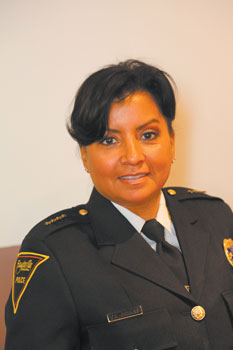 Fayetteville Police Chief Gina V. Hawkins testified on community policing practices before the U.S. House Judiciary Committee Sept. 19. She appeared on behalf of the National Organization of Black Law Enforcement Executives, or NOBLE. Hawkins is treasurer of the organization. The judiciary committee has oversight responsibility for federal and local police practices.
Fayetteville Police Chief Gina V. Hawkins testified on community policing practices before the U.S. House Judiciary Committee Sept. 19. She appeared on behalf of the National Organization of Black Law Enforcement Executives, or NOBLE. Hawkins is treasurer of the organization. The judiciary committee has oversight responsibility for federal and local police practices.
Rep. Gerald Nadler, D-NY, chaired the meeting. “Without question, the vast majority of law enforcement officers serve honorably under difficult conditions, often risking, and sometimes losing, their lives to protect us,” Nadler said. “There have been, however, a disturbing number of incidents of excessive force used by police against civilians — many of whom were unarmed, most of whom were people of color, and many of which resulted in tragic death — that have put incredible strain on the relationship between law enforcement and their communities.
“We should consider legislative proposals to end racial profiling and to restore trust between law enforcement and the community. And we should explore ways to strengthen data collection on the use of force and racial profiling so police departments can measure the practices they manage,” Nadler said in his opening remarks.
Committee Ranking Member Rep. Doug Collins, R-Ga, said he was “concerned that my colleagues on the other side of the aisle will turn today’s hearing into a crusade against all law enforcement officers based on isolated incidents.”
Collins added, “We — as Congress and as Americans — are nothing without the rule of law and its fair and uniform enforcement.”
“My predecessor used technical assistance resources … to help the agency establish a strategy to improve engagement at all levels of the department and particularly with communities of color,” Hawkins said. Her reference was to U.S. Department of Justice police assistance programs that retired Fayetteville Police Chief Harold Medlock sought out to improve local policing. In his three-and-one-half years at the helm of the FPD, Medlock worked tirelessly to improve relations in the African American community.
Chief Hawkins has said law enforcement agencies implement various strategies and methods to combat crime and ensure public safety. Those strategies extend beyond traditional models of responding to calls for service and often seek to increase crime prevention, intervention and response effectiveness. Community outreach, efficient resource distribution, crime mapping and data collection are concepts which comprise CompStat, a crime-reduction strategy that concentrates on improving physical and social order in high-crime locations.
“The safety of police officers and civilians alike depends, in large part, on the strength of the relationship between the police and the public,” said Seth Stoughton, a law professor at the University of South Carolina and a former police officer. “Public distrust of the police can decrease cooperation with law enforcement, which can, in turn, lead to an increase in violent crime. Police distrust of the public, in turn, can lead to an increase in officer misconduct and the use of force, as well as the adoption of aggressive, zero-tolerance tactics that further exacerbate the tension.”
Fayetteville Police Chief Gina Hawkins appeared before the U.S. House Judiciary Committee representing the National Organization of Black Law Enforcement Executives.